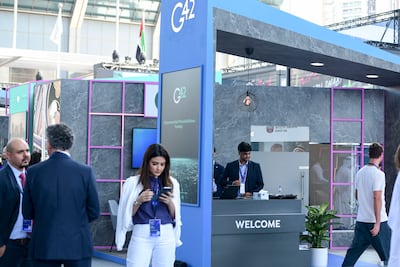Macroeconomic stability and the growth-oriented vision of the UAE's leadership are enhancing the country's appeal as an investment destination amid global economic uncertainty, panellists said at the Abu Dhabi Finance Week.
The development of the future economy and digitisation is at the top of the agenda of policymakers in the Emirates as well as in the broader region, which has the potential to nurture and grow multiple global super apps and become home to more unicorns, panellists said.
“Having a stable government helps a lot in how people view 'investability',” Todd Leland, president at Goldman Sachs International, told delegates in Abu Dhabi.
“You can have a debate about investability around the globe, [but] not all markets are as investable in 2023, as they were five years ago, or even 10 years ago.”
The economic and policy transformation that is taking place in Abu Dhabi, the UAE and the Middle East is another attraction for international investors, he said.
“I think the other thing is a transformation that's under way, if you look in particular in this region, and focus on Abu Dhabi for a second, the initiatives that are under way, the Vision 2030, the entrepreneurial nation programme, the SME programme … these are significant programmes that move an economy and move a market that people love to invest in,” Mr Leland said.
From a global lens, inflation, higher energy prices, geopolitical uncertainty and the rising interest rates are all posing headwinds, Mr Leland said.
The International Monetary Fund cut its global growth forecast for 2023 and warned of a cost-of-living crisis as the world's economy continues to be affected by the war in Ukraine, broadening inflation pressures and a slowdown in China.
The fund maintained its global economic estimate for this year at 3.2 per cent but downgraded next year’s forecast to 2.7 per cent — 0.2 percentage points lower than the July forecast.
Middle East and Central Asia economies are forecast to grow 5 per cent this year before decelerating to 3.6 per cent in 2023, after expanding 4.5 per cent in 2021, the fund said earlier this month.
Economies in the oil-rich bloc of GCC are projected to grow 6.9 per cent this year and their economic output is estimated to reach about $2 trillion in 2022, according to the World Bank.
The UAE economy, which bounced back strongly in 2021, is estimated to expand 5.4 per cent in 2022, according to the UAE Central Bank.
Emirates NBD, Dubai’s biggest lender, expects the economy to expand 7 per cent in 2022, setting up the country for its fastest annual expansion since 2011, when output grew by 6.9 per cent.
“We see a world of uncertainty”, but it is “really nice to be here in a place that's far more stable,” Mr Leland said.
“[Here] you see a region that is going to be significantly differentiated from some of those uncertainties around the world.”
Digitisation and the development of the FinTech sector as part of the UAE’s future economy agenda are top policy priorities for the UAE.

Both Abu Dhabi and Dubai have developed several programmes and regulations to further boost the FinTech sector and integrate the metaverse into the UAE's economy and society.
Over the past few years, the FinTech sector has evolved “substantially in the developed markets”. However, more recently, the pace of growth has picked up in emerging markets “more so in the Middle East, with UAE as the cradle, an accelerator” for FinTech growth, Dr Samer Haj-Yehia, chairman of Israel’s Bank Leumi told delegates.
“We have a number of factors that will keep this momentum going on. We have a stable economy, one of the few in the world that have double surplus in the government budget and the current account and over 5 per cent growth,” he said.
The push to innovation and digitisation, a fast developing start-up ecosystem and a young, mobile phone savvy population will also help the growth of the sector in the region.
“The Middle East, especially this part of the region, I consider it as a ‘blue ocean’ for investment, especially in the finance sphere,” Dr Haj-Yehia said.
“I think the Middle East is going to be the future of FinTech and I expect that super apps will come out of here and it's going to be a thriving economy, as well as a thriving banking system.”
The region has already seen unicorns emerging from the start-up ecosystem and there is potential for more in the UAE, be it banking as a service, buy now pay later or cybersecurity spaces.
“Together, you're going to have a number of unicorns coming up and the super apps for the region,” he said.
“So there is no reason why … not to have all of that scaled up throughout the entire region.”


